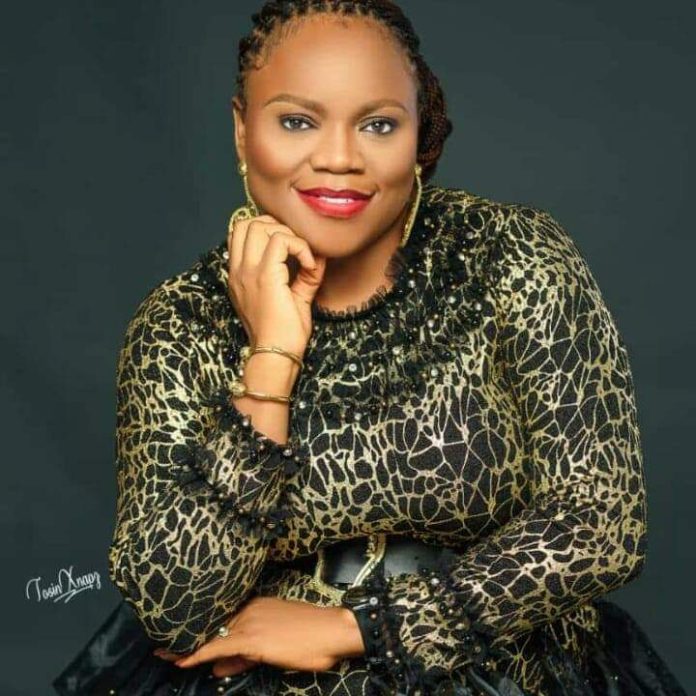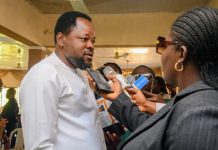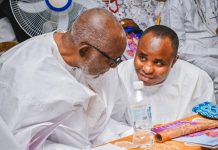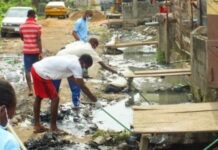
Dr Yetunde Olagbuji is the Director of Planning, Research and Statistics, Ondo State Primary Health Care Development Agency, whose passion over the years have been to develop the adolescents. In this interview, the Consultant Public Health Physician spoke on her career, family and the adolescents.
What was growing up like?
I grew up in a serene monogamous family setting as the second child where I had fun and thoroughly enjoyed every stage of my growth and development. I thank God for giving me one of the best and most caring parents I could ever wish for. My parents selflessly cared for us and gave us the best in life. My parents were good role models to us as they inculcated good values and virtues into us as children and their training shaped us all to be responsible individuals in our families and various fields of endeavor. The social environment where I grew up was peaceful, filled with love and devoid of rancor because of my Dad’s exceptional leadership role and this has sustained the strong bond between my siblings and me. Even though my Dad was very strict and termed a disciplinarian, he maintained a close relationship with all his children with his high sense of humor and caring heart.
What spurred you into medicine?
My love for people spurred me to study medicine coupled with the fact that I detest seeing people suffer. Also, I believe the inspiration I received from two Medical Doctors I came across as a teenager made me overtly determined to become a Medical Doctor, despite obstacles. So with God’s help as well as my parent’s guidance and encouragement, I was able to successfully study Medicine at the University. Interestingly, I became interested in Public Health, as a Specialty of Medicine, which involves the promotion of health, prevention and protection of people from diseases and health-related events in my second year at the University.
Career and family lifestyle, how have you been coping?
I have coped just fine because I have tried to maintain an excellent work-life balance. I understand that a man’s life is in phases and with this knowledge, I try to prioritize and give optimum attention to what is important in every phase of my life.
Generally, my first priority is God, so I give quality attention to building my personal relationship with Him. I believe my relationship with God will determine my altitude and my success in other areas of my life.
The next priority is my family and I am never tired of sacrificing for them. My definition of success is the measure of one’s positive impact on people and I would be a failure if I am not able to impact my immediate family meaningfully. So, I do not hesitate to reject appointments, meetings, and better career opportunities if my relationship with my husband and children would be infringed upon. For example, I opted for online degree programs (distance learning) to gain additional qualifications after my residency program because of my family.
However, as the children are growing, I am beginning to focus more on other areas of my life, such as my career, my purpose and vision.
It is my desire to reach the peak of my career and so I am undergoing continuous self-development at my pace since I am not in competition with anyone. Over the years, I have ensured that nothing and no one puts me under the pressure of comparison, and I have strategically selected only visionary close friends who share the same values as me.
Finally, I also do not joke with relaxation because when I am well rejuvenated, then I can be productive.
Your interest is the adolescents, what’s your motivating factor?
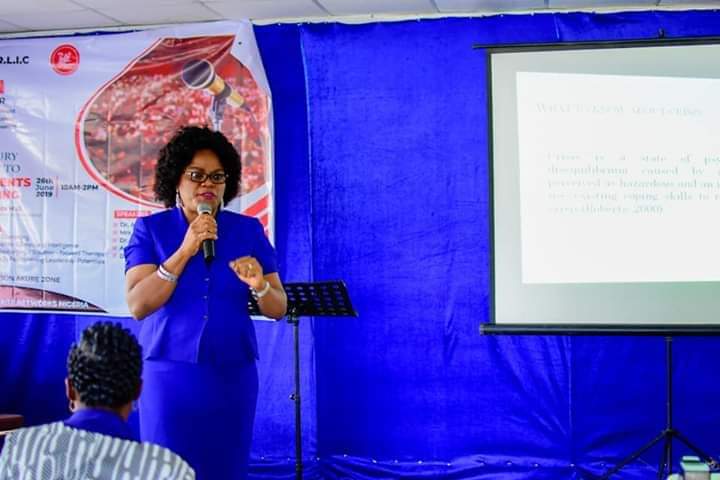
My motivation stemmed from the experience of a colleague of mine in our first year at the University. She got pregnant because of lack of adequate information about sexuality education. I was extremely touched by her experience and desired to help other adolescents/teenagers not to fall into the same pit.
My interest in the target group was sustained through divine orchestration and relationship with my project Supervisor in my final year at the University; Prof Adesegun Fatusi, who incidentally is an Adolescent Health Expert. I benefitted tremendously from my Supervisor’s wealth of experience as my final year project topic was on Adolescent Health. My Project Supervisor later became my Life Coach and Mentor and has contributed immensely to whatever I represent as a Public Health Physician and Adolescent Health Expert today as he has consistently given me his listening ears and shoulders to stand on.
What are the peculiar things you’ve discovered about the adolescents?
Adolescents (children between 10 and 19 years) constitute a significant proportion of any population. Adolescence is a transitional period between childhood and adulthood and it is a period where adolescents undergo rapid developmental changes. It is usually a period of vulnerability because of their intense desire to experiment with risky behaviors.
Adolescents are risk-takers, energetic, agile, productive, resourceful, and have great potential the society can harness for productive use, but unfortunately, they are often neglected in programming, not appropriately guided and given less attention by their caregivers because of other competing demands.
In the 21st century and with increasing poverty, adolescents have become more vulnerable due to societal risks with associated poor health outcomes. The prevalence of HIV/AIDs, Sexually Transmitted Infections, Teenage Pregnancy, Unsafe abortion and the death of adolescents have significantly increased. In addition, a high proportion of adolescents now engage in drugs and substance abuse and are involved in various forms of crimes, causing societal unrest.
Therefore, it is crucial that all stakeholders must act NOW by investing quality time, money, and all other resources in adolescents and young people. Also, their quality of life should be improved through the provision of an uninterrupted educational system and the creation of more job opportunities to prevent impending doom and unrest as some parts of the country are already experiencing.
Today, the youths are challenged with substance abuse, social media distraction, internet frauds, do you think a change in curriculum at the secondary school level, will salvage the situation?
I do not think there should be a change in curriculum at the secondary school level but rather the implementation of the existing curriculum should be enforced. Family Life and Health Education (FLHE) has been integrated into the secondary school curriculum since 2003 when the curriculum was published but it is poorly funded and implemented across secondary schools in Nigeria. There is no uniformity in the implementation of FLHE across schools and the monitoring and evaluation of the program is weak.
Contained in the FLHE curriculum are rich contents on Life-building skills- (such as Goal setting, Decision making, Assertive skills, Refusal skills, Negotiation skills, resilience skills, communication skills and Self-Esteem), which are skills every adolescent and young person should be equipped with to be able to successfully navigate through the period of adolescence. Studies have shown that where the FLHE curriculum is well implemented, there are better health outcomes for adolescents and young people because they are better able to make informed and healthier choices in life.
Also, many adolescents and young people lack access to the right information and guidance and so rely mainly on their peers and negative influences on social media. In this wise, I think the Heads of Schools, Principals and Civil Society Organizations should think outside the box to develop non-conventional and impactful programs to respond to the current challenges of adolescents/young people in order to bridge their knowledge gap and promote their healthy growth and development.
You’re a Director at the Ondo State Primary Health Care – the peak of your career, if we can say. How have you been able to cope in a men dominated environment?

Well, I have never given it a thought that I am in a male-dominated environment and I have never been intimidated by the male gender because I view myself as a person on assignment. So, I am only focused on my assignment and do not let being a female be a limitation.
I believe that I have been adequately equipped to fulfil my purpose on earth in my chosen field and I do not joke with personal and professional self-development so that I remain a voice to reckon with as a Public Health Physician. I also try to be diligent with all the tasks assigned to me as a Director and have created a niche for myself in the Public Health profession. I am motivated when I am challenged intellectually as I love to learn and unravel new ideas. In addition, I am an incurable optimist and I believe all things are possible for me to achieve as long as they are aligned with my core assignment. So being in a male-dominated environment is never an issue as I am only concerned about making an indelible mark in the sand of time in my Profession as a Public Health Physician and an Adolescent Health Expert.
Your interest also include the girl-child, don’t you think the girl-child is getting more attention than the boy? Then, why girl-child and not boy-child too?
My message is targeted at both male and female adolescents and young people because my vision is to promote the healthy growth and development of adolescents and young people (10-24 years), regardless of their gender.
I have never had any predilection for only girls because I understand that both sexes have to be given adequate attention to ensure national growth and productivity. However, stakeholders with more preference for girls invite me to their event as a Speaker.
It is quite obvious that most interventions by stakeholders are focused only on girls because of the discrimination against the girl child but the trend in the 21st century is fast changing because of the abounding negative influences on young people and if care is not taken, all the efforts on only the girl child may be counter-productive. For instance, there is an alarming increase in the incidence of gender-based violence (e.g. rape and intimate partner violence) involving girls and women, drug and substance abuse, kidnapping, armed robbery, cybercrimes, etc. because of the long-term neglect of the boy-child. This preference for the girl-child is equally reflected in the importance and priority given to the annual global celebration of the International Day of the Girl Child on the 11th of October. But unfortunately, the International Day of the Boy-Child on the 16th of May struggles for acknowledgement. It is therefore imperative that all the issues involving both sexes should be prioritized by all stakeholders so that the productive population of any nation, which this target group represents can be preserved, while their great potential are harnessed for socio-economic growth and development.
The negative trends in society have been blamed on parents. What do you think the parents are missing in the upbringing of their children?
In my opinion, the parents cannot only be blamed for the negative trends in society even though they are a critical stakeholder. The cause of the negative trend is multifactorial but for the sake of this interview, I will only focus on parents.
The home is the greatest citadel of learning where the parents are the teachers, so their role is very crucial to providing guidance and effective training to their children. However, some parents have failed in their roles and responsibilities because of the following reasons; uninvolved and permissive parenting styles; unavailability of parents to the children because of other competing demands; bad role modeling; ignorance about the developmental changes of adolescents; judgmental attitudes and unfriendly approach, preference for a favorite child over the other, poor communication skills, over-pampering of children, pessimistic attitude and child abuse.
Even though, I understand the economic downturn in our country which makes it necessary for both parents to work, there should be a plan and agreement between both parents on how to nurture and train their children. Both parents should not abandon their responsibilities in the pursuit of career or money; sacrifices should be made where appropriate to prevent future consequences and regrets. Also, parents should seek knowledge and counsels where necessary because 21st century parenting is a herculean task that requires tact and special skills.
You’ve an encouraging social media presence. We’ve seen your works and advocacy on it, particularly on You Tube. At a point, you stopped your YouTube videos. Do you think the social media can help salvage the challenges facing our adolescents? Then, why did you stop your weekly videos? Is the use of social media for advocacy expensive? What are the alternative media we can use to advocate to our youths?
All I have done for adolescents and young people have been borne out of my extreme passion to build them for purposeful impact so that they can be change agents where they live, work or play. Hitherto, I have joyfully utilized my time, knowledge, skills, and financial resources to achieve the little impact I have made in Ondo State. Just as you noted, I have a rich web presence to propagate my message to my target group because social media has been adjudged to be an effective medium for information dissemination to young people. So, I quite believe social media is one of the health promotional information channels that can help salvage the challenges faced by adolescents. However, to reach out to both the in-school and out-of-school adolescents as well as their caregivers, cutting across various socio-economic levels, other channels of communication such as seminars, sensitization meetings, community engagement, peer education, and use of information, education and communication (IEC) materials should be explored.
In the year 2017, I committed my financial resources to sponsor a weekly radio program to sensitize young people for a period of six months before I discontinued because of the financial burden as there were no sponsors. During this period, it was easy to post the weekly audio messages converted to videos on YouTube but after six months elapsed, I could no longer finance the program and so I had to stop the weekly post on my channel. However, I post occasionally on my YouTube channel when I organize online seminars for my target audience. Fortunately, I have consistently posted e-posters and write-ups on my other social media handles such as Facebook, Instagram, Twitter and LinkedIn. It is my desire to produce more content for my YouTube channel but for time, lack of helping hands, and my workplace engagements.
Regular engagement of graphic designers to produce information, education and communication materials for social media advocacy may be quite expensive but I had to get a training on graphic designing to reduce cost and to facilitate unhindered information dissemination on social media. Finally, I hope to be able to increase my effectiveness and efficiency in the propagation of information to young people in the nearest future, especially on my YouTube channel, by engaging a volunteer(s) to assist with this task.


